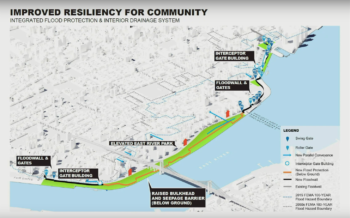
Rendering of proposed flood resiliency infrastructure./Image Credit: DDC, Parks, DOT, DEP, and Mayor’s Office of Resiliency/CPC
Despite the project’s phased construction schedule, concerns with the project still exist among elected officials and community members. On November 4, 2019, the City Council Subcommittee on Landmarks, Public Siting, and Dispositions approved two land use applications for the East Side Coastal Resiliency Project, the City’s flood protection plan for Lower Manhattan. The Project will include a system of floodgates and walls along the project area, sewage improvements, and will elevate East River Park eight feet above the flood plain to protect the Park and have it serve as a flood barrier for nearby neighborhoods. The first application is for access onto private property adjacent to the proposed flood protection infrastructure for the City to conduct inspections, maintenance, and repair of the infrastructure. The second application is for a zoning text amendment to allow higher wall heights for the proposed floodwalls and gates at Stuyvesant Cove Park.
The project will cover the area bounded by East 25th Street to the north, Montgomery Street to the south, and the East River to the east and runs along the FDR Drive and will impact East River Park, Asser Levy Park, Stuyvesant Cove Park, and Murphy Brothers Park. The Department of Transportation, Department of Environmental Protection, Small Business Services, and Department of City Administrative Services are the applicants. On September 23, 2019, the City Planning Commission approved the applications. During the public review process, the Lower Manhattan community had concerns about East River Park’s complete closure during construction. To read CityLand’s prior coverage on the decisions, click here.
On October 3, 2019, the Subcommittee held a public hearing on the applications. At the hearing, representatives from the Department of Design and Construction, Department of Parks and Recreation, and the Mayor’s Office of Resiliency presented the applications and phased construction plan. One day prior to the hearing, Mayor Bill de Blasio announced on October 2, 2019 that the East Side Coastal Resiliency Project’s construction will be phased to allow for nearly half of East River Park to remain open.
Department of Design and Construction First Deputy Commissioner Jamie Torres-Springer stated that project construction will begin in Spring 2020 and the entire East River Park will be open until Fall 2020. From Fall 2020 to Spring 2023, 42 percent of the park will remain open. Pier 42 Park, located south of East River Park, will be completed and opened in Summer 2022, serving as an alternative to East River Park. From Summer 2023 to the end of 2025, about 50 percent of the park will be open, including the newly constructed portions. The flood protection systems will be completed by the hurricane season of 2023 and East River Park will be fully completed and reopened at the end of 2025. Torres-Springer also explained that the construction for the area north of 14th Street would also be constructed in phases to preserve available open space during construction.
Council Members Carlina Rivera, Keith Powers, and Margaret Chin, whose districts are impacted by the East Side Coastal Resiliency Project, commended the City for their decision to phase project construction; however, they had concerns about the project including the lack of transparency, a need for interim flood protection during the project’s construction, and the construction’s environmental impacts.
Council Member Rivera stated that the Department of Design and Construction failed to give the community notice when plans for the East Side Coastal Resiliency Project were changed. Council Member Rivera referred to the agency’s October 2018 decision to reconstruct and elevate East River Park instead of building floodwalls and levees behind East River Park.
Design and Construction Commissioner Lorraine Grillo explained the City’s decision and noted that the construction of levees and floodwalls would have resulted in long-term nighttime construction by nearby NYCHA developments and involved construction near Con Edison power lines, which posed an outage risk. Grillo explained that the current approach moves construction away from the housing developments and power lines and would better protect East River Park and nearby neighborhoods from flooding.
Council Member Rivera also noted that she and Manhattan Borough President Gale Brewer hired an independent resiliency consultant to review the East Side Coastal Resiliency Plan. The review, released on October 10, 2019, had several recommendations for the project including the creation of a community advisory group to increase transparency, the monitoring of air quality, soil quality, dust, noise, and vibration during construction, and placing sandbags or deployable flood barriers along FDR as interim flood protection measures.
Manhattan Borough President Gale Brewer, State Senator Brian Kavanagh, and Dan Wiley, Congress Member Nydia Velazquez’s District Manager, and representatives of Manhattan Community Boards 3 and 6 testified in support of the phased construction and shared the concerns brought by the Council Members. They also urged the City to implement the independent review’s recommendations in the project.
Members of the public were divided on the project with supporters stating that the project is urgently needed in the face of climate change and opponents stating that East River Park’s reconstruction is not worth the destruction it causes and would rather pursue alternatives. However, both sides shared the same concerns raised by the impacted elected officials.
On November 4, 2019, the Subcommittee voted to approve the applications.
By: May Vutrapongvatana (May is the CityLaw Fellow and New York Law School Graduate, Class of 2019)

